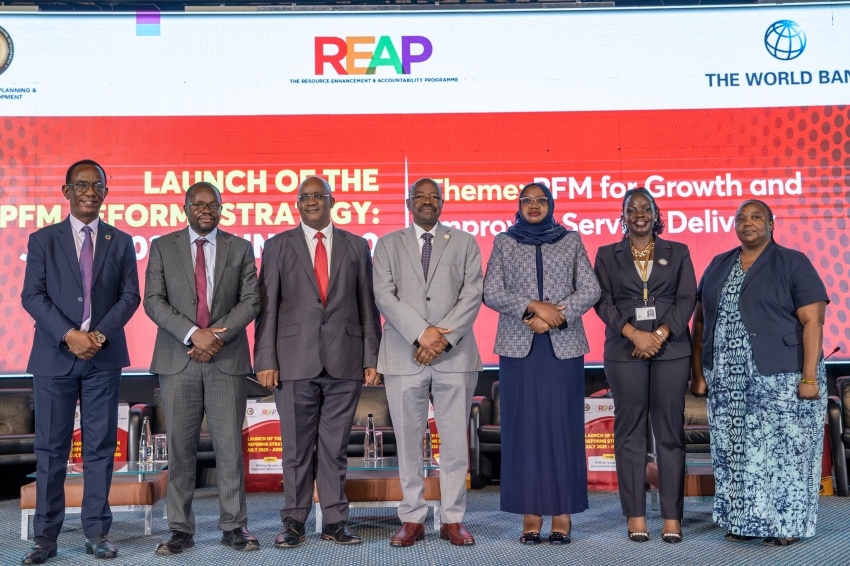UGANDA LAUNCHES PFM REFORM STRATEGY TO BOOST SERVICE DELIVERY
PUBLISHED — 24th, July 2025
Uganda has officially launched its new Public Financial Management (PFM) Reform Strategy for the period July 2025 to June 2030, a bold initiative aimed at fostering economic growth and enhancing service delivery.
The launch event, held at the Serena Hotel in Kampala, was officiated by the Minister of State for Finance, Planning and Economic Development (Planning), Hon. Amos Lugoloobi, on behalf of Prime Minister Robinnah Nabbanja.
Held under the theme “PFM for Growth and Improved Service Delivery”, the event drew participation from top technocrats, policy makers, economists, academia, civil society, and private sector representatives.
Lugoloobi underscored the government’s commitment to transforming Uganda’s economy through stronger financial systems.
“PFM is a special purpose vehicle through which government plans are translated into roads, schools, health services, and other tangible outcomes,” he said.
The strategy, which aligns with Uganda’s Tenfold Economic Growth ambition to grow the economy from $50 billion to $500 billion by 2040, emphasizes revenue mobilization, fiscal discipline, and the efficient use of public resources.
It also seeks to improve planning and budgeting, accountability, and the use of technology across public institutions.
Key reforms include automation of financial management systems such as the Integrated Financial Management System (IFMS), Electronic Government Procurement (eGP), and Human Capital Management (HCM) systems. These digital platforms are designed to enhance transparency, reduce fraud, and improve efficiency in public service delivery.
“The gains we’ve made must not only be preserved but also institutionalized for future growth. PFM is not just about numbers; it’s about trust, delivery, and building a Uganda where every shilling counts,” Lugoloobi concluded.
Kampala Capital City Authority (KCCA) Executive Director Hajjat Sharifah Buzeki, who was among the key panelists, delivered a compelling account of how PFM reforms have positively impacted service delivery in urban governance.
Before the reforms, she noted, public institutions struggled with non-uniform budgets and fragmented work plans that hindered coordination and delivery.
“Uniformity in budgets and planning was a nightmare. It was difficult to coordinate city projects, and even more difficult to measure performance across local governments,” Buzeki recalled.
However, with the introduction of structured PFM reforms, there is now a clear yardstick for performance measurement. “Today, we can tell with certainty whether a department or unit has delivered or not. It’s no longer guesswork,” she emphasized.
Buzeki highlighted how automation has created a paperless environment, reduced operational costs, and improved access to real-time financial information.
“With systems like IFMS and the Treasury Single Account, we can easily trace and account for funds even those disbursed 10 years ago. Internal controls have been significantly strengthened, and instances of fraud have greatly reduced,” she said.
She also pointed out the importance of documenting Service Delivery Standards a practice that KCCA has institutionalized as part of its accountability framework. “This is one of the most practical reforms we’ve embraced. It is not theoretical or left on paper; it’s being implemented and monitored,” Buzeki asserted.
The panel discussion featured Prof. Ibrahim Mike Okumu (Dean, School of Economics, Makerere University), Julius Mukunda (Executive Director, CSBAG), Stella Nyapendi Chombo (Member, Tax Appeals Tribunal), and Veronica Namwanje (Executive Secretary, USSIA).
The experts emphasized the need for building planning capacity among public officers and called for greater flexibility in government spending to respond to real-time citizen needs. “We know our national priorities roads, schools, health but there must be room to adapt funding allocations when needed,” said Mukunda.
Prof. Okumu stressed the importance of aligning PFM reforms with broader economic policy and academic research, while Veronica Namwanje urged for more inclusion of private sector players to enhance implementation.
Permanent Secretary and Secretary to the Treasury (PSST), Ramathan Ggoobi, reaffirmed the strategy’s potential in achieving inclusive growth. He noted that the reforms also explore avenues to strengthen Foreign Direct Investment (FDI) flows while ensuring fair taxation of foreign entities operating in Uganda.
As the PFM Reform Strategy enters its implementation phase, the Ministry of Finance aims to ensure full ownership by MDAs, local governments, and stakeholders across sectors.
The strategy is expected to strengthen Public Investment Management (PIM), improve returns on development spending, and secure long-term sustainability of reforms.
News & Announcements
6th, December 2025
5th, December 2025
4th, December 2025
3rd, December 2025
2nd, December 2025
29th, November 2025
28th, November 2025
27th, November 2025
18th, November 2025
15th, November 2025





















Development partners